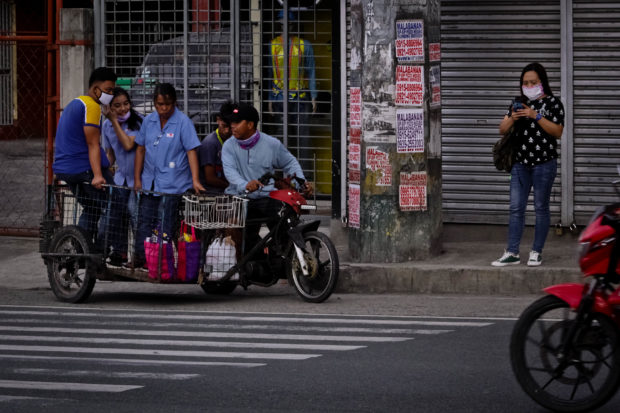CITY OF SAN FERNANDO, Pampanga, Philippines — If threats don’t work, can memes make people take the new coronavirus disease (COVID-19) seriously and obey the Luzon-wide enhanced community quarantine?
Historian Francis Musni has started admonishing the “pasaway” (stubborn and defiant people) in Kapampangan through social media memes that superimposed berating phrases over more than 20 old photographs in his archives that looked back at moments in time when the country grappled with diseases.
Memes are photographs, images or videos that contain phrases or ideas that tell hilarious and relatable stories.
In one blurred studio shot of six people dressed in their Sunday best, Musni, 43, wrote: “E yu cami apusan. E cami memintu qng quarantine aniang cholera epidemic qng Pampanga aniang 1902. (Don’t imitate us. We did not heed the quarantine when cholera spread in Pampanga in 1902).” Below the photograph are a cross and the initials RIP (Rest in Peace).
Another meme shows Huk leader Luis Taruc wearing a face mask and asking his townmates in San Luis to follow the rules because “they are for our own good.” This ends with an assuring note: “Salese mu rin Abe” (Things will get better my friend).
In some memes, Musni featured personalities known in Pampanga localities: Gen. Jose Alejandrino of Arayat town; Chief Justice Jose Abad Santos of Angeles City; Bayung Tau (Tarik Soliman) in Macabebe town; and Crissot (poet Juan Crisostomo Soto) of Bacolor.
STAY HOME Memes shared on social media are accompanied by text written in Kapampangan to encourage residents of Pampanga to follow the community quarantine while the country is on a health emergency. An image of a prominent Kapampangan, the late President Diosdado Macapagal (above, also with medical mask), is shown in a meme asking a farmer to go home while another recalls the impact of the cholera epidemic in Pampanga in 1902 (top photo). —CONTRIBUTED PHOTOS
Optimistic messages
Two of the memes feature young women expressing optimistic messages like, “We can do it! Akabyusan tamu ini magdatun bale at mibabatang e pa mu lulual. Salese mu rin” (We can overcome [COVID-19] by staying at home and patiently resisting going out. Things will get better).
Two memes used old commercial posters of a cooking oil product and a margarine brand to assert that the quarantine was the “Order ni Mrs.” (Order of the woman of the house; the wife’s command) and breaking it meant getting hit by a lady with a bow and arrow.
“I intended some to have some cultural value and others even funny,” said Musni, whose day job is serving as a clerk of court.
“I wanted to encourage our people to heed the government’s call to obey the quarantine laws that were imposed, in an interesting and patriotic manner,” he said.
REBORN Old photographs of ordinary folk and Kapampangan celebrities are repurposed for memes admonishing people who refuse to stay indoors and protect themselves against the spread of the coronavirus. Among the personalities featured on these memes are Hukbalap leader Luis Taruc (above, with a digitally superimposed medical mask) and the late actor Rod Navarro (top photo). —CONTRIBUTED PHOTOS
Timely
Musni’s memes were timely, said Robby Tantingco, executive director of Holy Angel University’s Center for Kapampangan Studies.
On March 16, President Duterte placed the entire Luzon under enhanced community quarantine due to the rising COVID-19 cases.
It officially began on midnight of March 17 and would end on midnight of April 13.
Under the enhanced community quarantine, strict home quarantine is implemented in all households while public transportation is suspended.
Emotional resonance
The provision for food and essential services is also regulated and the presence of uniformed personnel is heightened to enforce quarantine procedures.
“Now more than ever, the use of local languages will be effective in convincing people in the regions because local languages carry cultural and emotional resonance that a national or international language does not have,” Tantingco said.
“This is the time to appeal to people’s primal instincts and the mother tongue is one way to do it,” he said.
Not everyone has been complying with the enhanced community quarantine, according to lawyer Socrates Adan Padua, chief of the public attorney’s office in Pampanga province.
As of March 25, 171 people in the province, except in the cities of Angeles and Mabalacat, had asked assistance for violating the quarantine.
They were charged with violation of Article No. 151 (Resistance and disobedience to a person in authority) of the Revised Penal Code, which set a penalty of jail time and fines ranging from P2,000 to P100,000.
“Majority of them were drunk when arrested,” Padua said.
